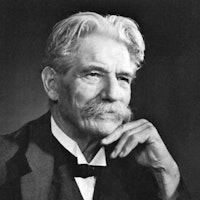Faith which refuses to face indisputable facts is but little faith. Truth is always gain…
Faith which refuses to face indisputable facts is but little faith. Truth is always gain…
Albert Schweitzer

The Straight Way of Faith
Topic: Belief & Faith
Faith which refuses to face indisputable facts is but little faith. Truth is always gain, however hard it is to accommodate ourselves to it. To linger in any kind of untruth proves to be a departure from the straight way of faith.
Albert Schweitzer was born on January 14, 1875, in Kaysersberg, Alsace, into a family deeply rooted in the traditions of religion, music, and education. Both his father and maternal grandfather were Lutheran ministers, and his early exposure to church life, theological study, and classical music shaped his intellectual and spiritual development. He pursued theology and philosophy at the University of Strasbourg, earning a doctorate in philosophy in 1899 with a focus on Immanuel Kant’s religious thought. In 1900, he received his licentiate in theology. His academic and pastoral work during this period included preaching at St. Nicholas Church and serving in leadership roles at the Theological College of St. Thomas. In 1906, he published The Quest of the Historical Jesus, a critical work that contributed to modern theological scholarship.
Alongside his theological and philosophical work, Albert Schweitzer was a gifted musician. He began studying piano and organ in childhood and was performing publicly by the age of nine. He went on to become an internationally known concert organist, using income from performances to fund both his education and later medical missions. As a musicologist, he published a biography of Johann Sebastian Bach in 1905 and contributed to the study of organ building and playing. In 1905, he made a pivotal decision to study medicine with the goal of becoming a medical missionary. He earned his medical degree in 1913 and soon after established a hospital in Lambaréné, French Equatorial Africa, where he and his wife later endured internment during World War I.
After returning to Lambaréné in 1924, Albert Schweitzer dedicated the remainder of his life to expanding and maintaining the hospital, which grew into a complex capable of treating hundreds of patients. He combined the roles of physician, surgeon, pastor, administrator, writer, and host, drawing on his wide range of training and experience. His written works during this time included On the Edge of the Primeval Forest and Civilization and Ethics. Schweitzer received several international honors, including the Goethe Prize and the 1953 Nobel Peace Prize. The prize money supported the establishment of a leprosarium at Lambaréné. Albert Schweitzer died there on September 4, 1965, leaving behind a legacy grounded in service, scholarship, and what he called “Reverence for Life.”
The Spiritual Life
Schweitzer, Albert. The Spiritual Life: Selected Writings of Albert Schweitzer. 1947, (Originally published as Albert Schweitzer: An Anthology) p. 290.

Albert Schweitzer
Theme: Belief and Faith

Commentary on Albert Schweitzer’s Quote [Brief Intro]
Albert Schweitzer’s Quote [Longer commentary]
Albert Schweitzer
Additional Albert Schweitzer Quotes
Resources
Related Quotes
Copyright © 2017 – 2026 LuminaryQuotes.com About Us